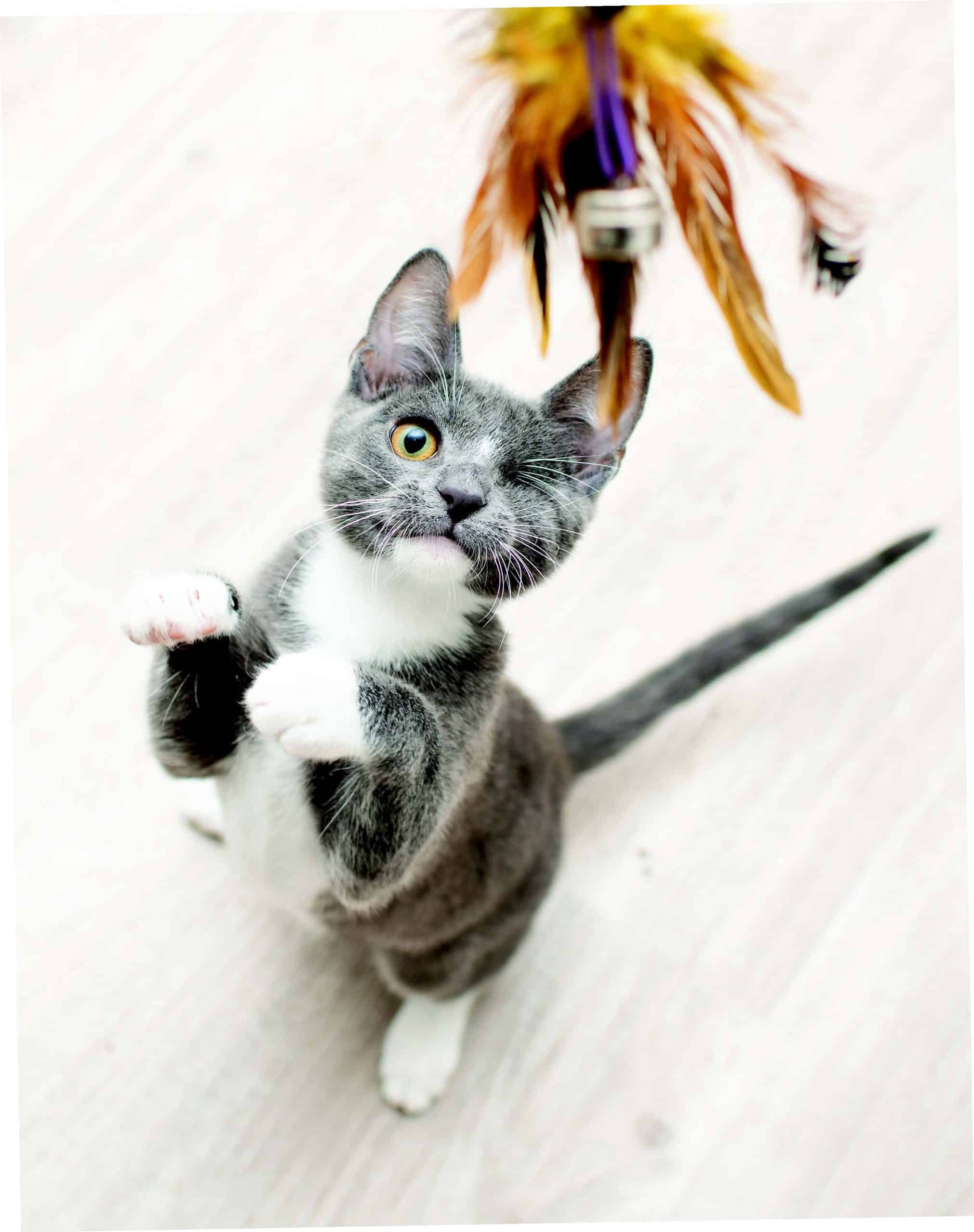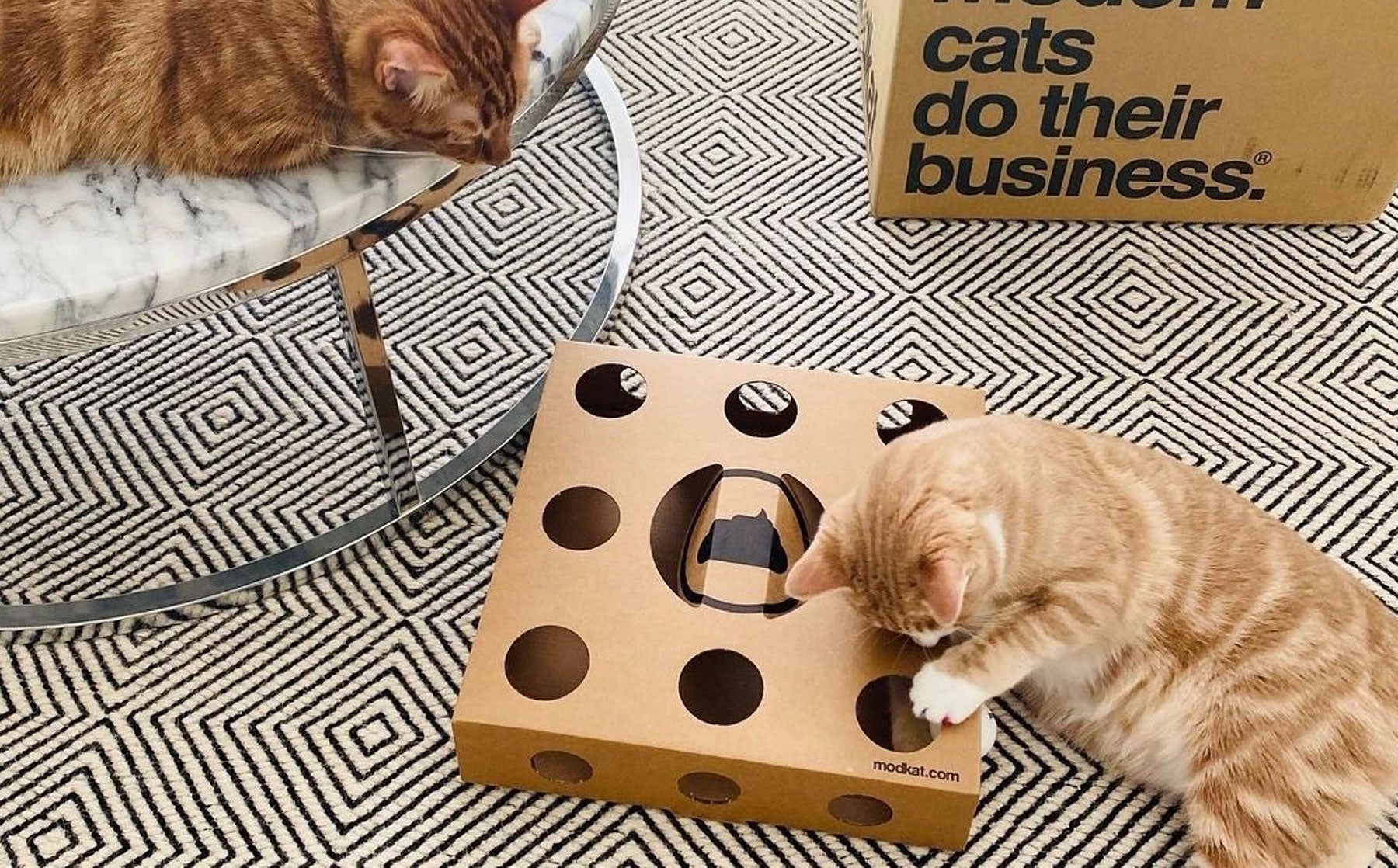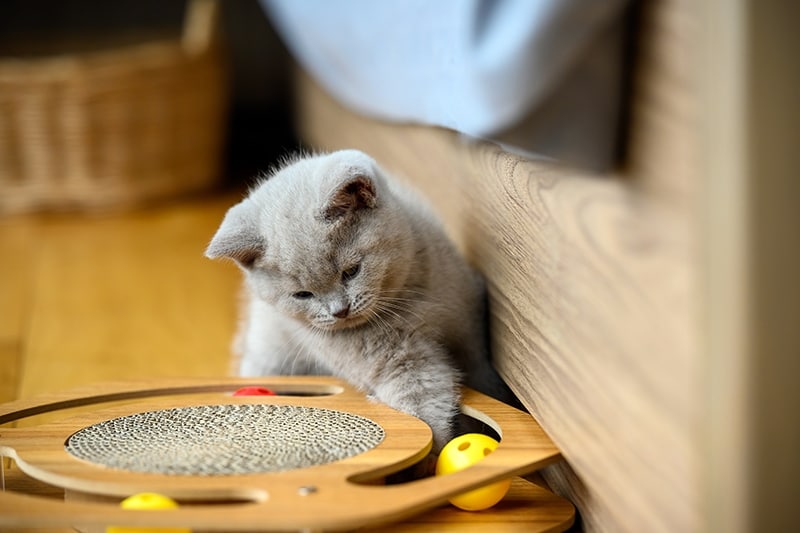The Importance of Mental Stimulation for Cats

Cats are intelligent and curious creatures, and just like humans, they need mental stimulation to keep their minds sharp and engaged. Mental stimulation is essential for cats as it helps prevent boredom, reduces stress, and promotes overall well-being.
When cats don't get enough mental stimulation, they can become easily bored and may exhibit destructive behaviors or engage in excessive grooming. Boredom can also lead to weight gain and other health issues since cats may turn to overeating when they have nothing else to do.
By providing your cat with regular mental stimulation, you can help enrich their lives and ensure they stay happy and content. Mental stimulation not only keeps them physically active but also engages their minds, preventing cognitive decline as they age.
One of the easiest ways to provide mental stimulation is through interactive play. Playing with your cat using toys that mimic prey can help satisfy their natural hunting instincts and keep them mentally engaged. You can use wand toys with feathers or strings and encourage your cat to chase and pounce on them. This not only provides physical exercise but also challenges their problem-solving skills as they plan their attacks.
Another great way to stimulate your cat's mind is through food puzzles. These puzzles require the cat to work for their food by manipulating objects or solving a small task before being rewarded with a treat. Not only does this provide mental stimulation but it also slows down eating, which can be beneficial for cats prone to eating too quickly.
Training sessions are another fantastic way to engage your cat's brain. Contrary to popular belief, cats are trainable animals. By teaching them simple tricks like sit or high five, you not only give them a mental workout but also strengthen the bond between you and your feline friend.
In conclusion, providing mental stimulation is crucial for enhancing feline intelligence. Through interactive play, food puzzles, training sessions, and other mentally stimulating activities, you can keep your cat's mind sharp and prevent behavior problems caused by boredom. So, make sure to incorporate brain games into your cat's daily routine for a happy and mentally stimulated companion.
Understanding Your Cat's Unique Intelligence

Cats are incredibly intelligent creatures, but their intelligence is unique and different from other animals. Understanding your cat's unique intelligence is essential for providing effective mental stimulation and engaging them in brain games.
Firstly, cats possess exceptional problem-solving skills. They have a natural ability to analyze situations and come up with creative solutions. This intelligence is rooted in their hunting instincts, as they need to strategize and plan their attacks on prey. When designing brain games for your cat, consider activities that require problem-solving, such as puzzle toys or hiding treats for them to find.
Secondly, cats have an incredible memory. They can remember things like the layout of their territory, the location of food sources, and even specific cues related to playtime or feeding. Use this memory power to your advantage when teaching your cat new tricks or introducing new brain games. Repeat cues consistently and reward them with praise or treats when they respond correctly.
Furthermore, cats possess keen sensory perception. Their senses of sight, hearing, and smell are highly developed. Incorporate games that stimulate these senses into their mental stimulation routines. For example, you can use toys that make sounds or have moving parts to engage their hearing and sight. Scent-based puzzles can also encourage them to use their sense of smell.
Additionally, cats have an innate curiosity that drives their desire for exploration and discovery. They are naturally inclined to investigate new objects and environments. Take advantage of this curiosity by offering interactive toys or creating obstacle courses for them to explore. Introduce new textures, scents, or sounds to keep them engaged and mentally stimulated.
Lastly, cats have different individual personalities and preferences when it comes to mental stimulation. Some may prefer more physically demanding activities like chasing toys or climbing structures, while others enjoy quieter brain games like solving puzzles or finding hidden treats. Observe your cat's behavior closely to understand what type of activities they enjoy the most.
In conclusion, understanding your cat's unique intelligence is crucial for providing effective mental stimulation. By recognizing their problem-solving skills, memory power, sensory perception, curiosity, and individual preferences, you can choose brain games that will engage and challenge your cat in a way that suits their abilities and interests. Remember to observe their behavior and adjust the activities accordingly to keep them mentally stimulated and satisfied.
Choosing the Right Brain Games for Your Feline Friend

When it comes to providing mental stimulation for your cat, choosing the right brain games is essential. Every cat has unique preferences and abilities, so it's important to select activities that will engage and challenge them in a way that suits their individual intelligence.
One factor to consider is the level of difficulty of the brain games. Start with simpler puzzles or interactive toys for cats who are new to mental stimulation. As they become more familiar with these activities, gradually increase the complexity to keep them challenged. On the other hand, if your cat is already adept at solving puzzles, you may need to choose more advanced brain games to keep them engaged.
Another aspect to consider is the type of game or toy that will appeal most to your cat. Some cats prefer toys that involve chasing and pouncing, while others enjoy problem-solving activities such as puzzle feeders or treat-dispensing toys. Observe your cat's behavior and play preferences to determine which types of brain games they are most likely to enjoy.
It's also important to consider your cat's physical limitations when choosing brain games. For example, older cats may have difficulty with activities that require jumping or climbing, while cats with mobility issues may struggle with certain puzzle toys. Ensure that the brain games you select are appropriate for your cat's age and physical abilities.
Consider rotating the brain games regularly to keep your cat stimulated and prevent boredom. Cats can quickly lose interest in repetitive activities, so introducing new challenges and toys can help maintain their engagement.
Lastly, remember that safety should always be a priority when selecting brain games for your feline friend. Avoid small parts that could be a choking hazard and choose high-quality toys that are durable and non-toxic.
By choosing brain games that match your cat's abilities, preferences, and physical limitations, you can provide them with enjoyable mental challenges that promote cognitive development and prevent behavioral issues caused by boredom. Remember, each cat is unique, so take the time to observe and understand your feline friend to ensure they get the most out of their brain games.
Teaching Your Cat New Tricks

Teaching your cat new tricks can be a fun and rewarding way to provide mental stimulation. While cats may not be as easily trained as dogs, they are still capable of learning and performing a variety of tricks. By breaking down the training process into small steps and using positive reinforcement techniques, you can effectively teach your cat new skills.
When teaching your cat new tricks, it is important to start with basic commands that are easy for them to understand. For example, you can begin by teaching them to sit or come when called. Use treats or their favorite toys as rewards to reinforce the desired behavior. Remember to keep training sessions short and frequent, as cats have shorter attention spans compared to dogs.
One effective technique for training cats is clicker training. This involves using a small device that makes a distinct clicking sound whenever your cat performs the desired behavior. The click serves as a signal that they have done something right, and will be followed by a treat or reward. Over time, your cat will associate the click with positive reinforcement and will be more motivated to repeat the behavior.
Patience is key when teaching your cat new tricks. It is important to remember that every cat learns at their own pace, so be prepared for some setbacks along the way. If your cat seems uninterested or resistant during training sessions, take a break and try again later. Avoid getting frustrated or punishing your cat during training, as this can hinder their progress and create negative associations.
In addition to providing mental stimulation, teaching your cat new tricks can also strengthen the bond between you and your furry friend. It gives them an opportunity to engage with you in a positive and interactive way. Celebrate every small achievement during the training process and remember to always end each session on a positive note.
By taking the time and effort to teach your cat new tricks, you are not only keeping their minds active but also providing them with opportunities for growth and development. Be consistent, patient, and reward their successes, and you will be amazed at what your cat can achieve.
Creating DIY Cat Puzzle Toys

Creating DIY Cat Puzzle Toys offers a great opportunity to engage your feline friend's natural curiosity and intelligence. These interactive toys not only provide mental stimulation for cats, but they also encourage problem-solving skills and can help prevent boredom and destructive behaviors.
To start creating DIY cat puzzle toys, you can utilize everyday items found around the house. Begin with simple puzzles, such as using an empty water bottle or a cardboard box with holes cut out. Place some treats or dry food inside and let your cat figure out how to retrieve the goodies.
Another option is to make a homemade treat dispenser using a toilet paper roll or an empty plastic container. Cut small holes in the tube or container, fill it with treats, and watch as your cat tries to figure out how to get their reward by rolling or pawing at it.
If you're feeling creative, you can design more complex puzzle toys by combining different materials. For example, take a shoebox and cut various holes in it. Fill the box with crumpled pieces of paper hiding treats within them. This will challenge your cat to explore and use their paws to search for the hidden rewards.
You can also create a scavenger hunt for your cat by hiding treats throughout the house. Use their favorite spots or high perches to encourage them to jump and climb while searching for the hidden surprises.
Remember, safety should be your top priority when making DIY cat puzzle toys. Avoid using small objects that could be swallowed or pose a choking hazard. Monitor your cat during playtime and remove any damaged items or parts that might cause harm.
Additionally, keep in mind that each cat has its own level of intelligence and problem-solving abilities. Be patient with your furry companion as they learn how to solve these puzzles. Provide lots of encouragement and positive reinforcement when they succeed in retrieving treats from their homemade toys.
Creating DIY Cat Puzzle Toys is a cost-effective way to keep your cat mentally stimulated and entertained. These interactive toys not only provide a fun activity for your cat but also strengthen the bond between you and your feline friend. So go ahead and get creative, and watch your cat enjoy the challenge of solving their very own homemade puzzles.
Other Ways to Challenge Your Cat's Brain

In addition to DIY cat puzzle toys, there are several other ways to challenge your cat's brain and provide mental stimulation. These activities will keep your feline friend engaged, entertained, and mentally sharp.
- Interactive Play Sessions: Regular interactive play sessions with your cat can be an excellent way to challenge their brain. Use toys that mimic prey, such as feathers or toy mice, or try a laser pointer to encourage them to chase and pounce. This type of play allows cats to exercise their natural hunting instincts and provides mental stimulation as they strategize and plan their moves.
- Clicker Training: Clicker training is a positive reinforcement technique that can help teach cats new tricks and behaviors. By associating the click sound with a reward like treats, you can train your cat to perform various actions, such as jumping through hoops or sitting on command. This training not only stimulates their minds but also strengthens the bond between you and your cat.
- Food Puzzle Toys: Food puzzle toys are another great way to challenge your cat's brain while providing them with a tasty reward. These toys require cats to work for their food by solving puzzles or manipulating objects to access the treats inside. You can find a variety of food puzzle toys on the market or make your own using household items like cardboard tubes or boxes.
- Hide-and-Seek Games: Cats love the thrill of searching for hidden objects! Hide treats or favorite toys in different spots around the house for your cat to find. This game stimulates their sense of smell and keeps them mentally engaged as they explore and search for hidden treasures.
- Rotating Toys: To prevent boredom from setting in, rotate your cat's toys regularly. By introducing new toys or rearranging existing ones, you provide novelty and keep their interest levels high. Remember to always supervise playtime with toys and remove any damaged items that could pose a choking hazard.
Remember that every cat is unique, so be patient and observe your cat's preferences and abilities. Some cats may excel at certain activities while others may prefer different challenges. The key is to provide a variety of ways to challenge their brain and give them opportunities for mental stimulation on a daily basis.
By incorporating these other ways to challenge your cat's brain into their routine, you'll keep them mentally engaged, prevent boredom, and promote a happier and healthier feline friend.




0 Comments